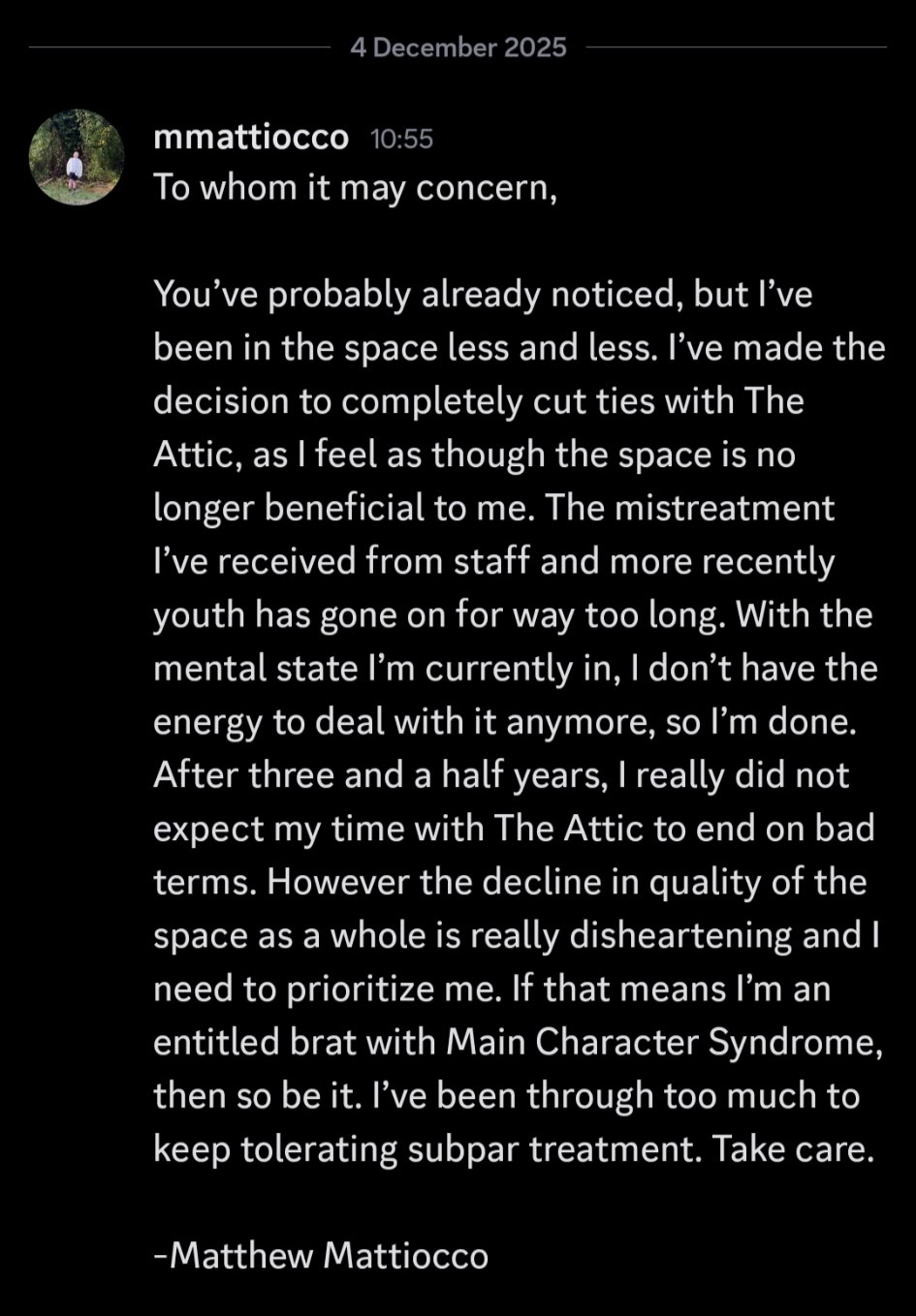List of complaints & issues at The Attic Youth Center
Some of these bullet points are to be explained in further detail.
Pushiness and persistent about staying and attending the Attic regularly
Excessive marketing of the Attic, especially during meetings and therapy sessions
Unwillingness to accept or listen to critiques/criticism

“Hi everyone. It looks like I can't respond to Matthew directly here, but I will be emailing to connect about this.
I do want you all to know that the Attic staff team will always make space and time to hear any feedback. That being said, we won't know you have feedback for us unless you let us know directly. Need to connect with leadership? Just ask someone if we're available. Or send an email. There is almost always at least one director on site. While we may be in a meeting or doing something else, we will always do our best to meet with you or find a time to do so.”
Response by Jasper
Susan’s testimony of this complaint:
Despite staff being persistent about the Attic staff being open to feedback and willing to leave space and time for feedback, they never actually do any work in reflecting on the feedback they’re given.
There’s been numerous times of racism, racial discrimination, ableism, discrimination based on disability and chronic pain, and so much more including a generally toxic and unhealthy environment/community.
Community spaces are meant to be safe and inclusive. But instead of listening to the youth who attend regularly (by coercion of course) and are active in the space (again by coercion), reflecting, and implementing on how to do better based on the feedback, you throw excuses and justifications while making the same blanket statement to shut down criticisms.
All the youth could up and leave and all with the same complaints as us, but the most you would do is serve us the same statement of “we make sure to make space and provide a safe environment for feedback.” All that means to us is you do not truly value your youth and their feedback.
You “make space and time to hear any feedback” but what that actually shows is that you lack the fundamental understanding and comprehension of what your actions actually are.
To you and the Attic staff, it appears in your eyes as if you’re victims of unnecessary and unwarranted harsh criticism. After all, to the staff, it might’ve appeared like a privilege and a great benefit to be in the space the Attic provided.
However through the lens of the youth, it was nothing of that sort. It was neither a privilege nor a beneficial experience.
Did we get money? Yes. Granted, we got our money late at times and had to endure poor communication from the staff. We were also told despite the staff not communicating anything to us, we couldn’t ask for communication from the PHMC who provides the Attic the money for the OST and WorkReady programs.
Was the money worth the emotional and mental toll? No. Not even a billion dollars could pay off the mental and emotional debt the Attic owes us. The Attic has significantly taken a toll on the mental health of me and my friends.
Through the lens of the youth who left the Attic on bad terms, we were emotionally abused and coerced into staying through monetary means and guilt tripping.
You coerce and persuade people to stay despite them not wanting to be apart of the clearly toxic and unhelpful community. You deflect and victim blame while shifting focus off of you to devoid yourself of responsibility of your actions and harm that you caused.
Unhealthy toxic environment that is very cliquey and cult-like
Accessibility is not prioritized and often not taken into careful consideration
While the building is technically accessible with an elevator, often the staff fail to take people with mobility issues into consideration. There's been youth with POTS and heart issues and youth with chronic pain.
Both of these youth have faced issues at the Attic due to their mobility issues and the Attic fails to make an inclusive space for these youth to be included. During trips that take place in OST or WorkReady, youth are usually expected to walk during the trips. The staff tend to overestimate the youth with disabilities and their ability to walk certain distances.
Mitsuki (a former youth) reported an experience where on a trip to Washington D.C., they had extreme issues with their mobility that they had to continue in a wheelchair. Later on, they were pulled aside by a staff named Coniyah and told that they should've notified the staff if they knew they would be having issues with mobility.
This was said in spite of the youth having been obvious and clear about their mobility issues to most of the staff. The youth stated that most of the staff were aware of their issues with walking. Yet none of the staff even thought to consider how to make their trip more accessible to the youth attending.
Along with mobility accessibility issues, the actual place is chaotic and a sensory nightmare to be in. It's been reported by other youth that it's overwhelmingly loud. Although the majority of the youth there are autistic or neurodivergent, they don't even offer headphones anymore for those overstimulated.
Safety and accommodations are also not considered carefully
“It feels like they openly admitted had I fainted while in Washington they had nothing planned.”
Context: The quote is provided by Mitsuki who had gone through WorkReady in the summer of 2025 at the Attic. During the WorkReady that summer, they had a trip to Washington D.C. In that trip, Mitsuki had faced issues with mobility and a significant drop in their iron levels and had to proceed in a wheelchair.
